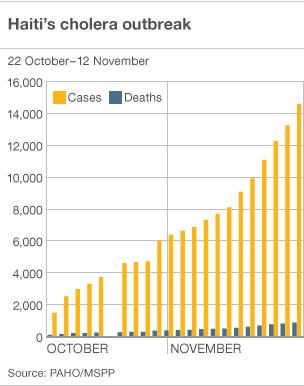Haiti protester shot dead by UN peacekeepers
- Published
Amateur footage shows a group of protesters in Cap Haitien.
At least one man has been shot dead in clashes with UN peacekeepers in Haiti.
UN troops fired tear gas to disperse demonstrators who were throwing stones and blocking roads in Cap Haitien.
The protests come amid a continuing cholera epidemic that has killed more than 900 people, but the UN has also linked them to upcoming elections.
UN peacekeepers in Cap Haitien and Hinche were the target of protesters wielding stones and in some cases - the UN says - guns.
Some Haitians have accused peacekeepers from Nepal of introducing cholera to Haiti for the first time in a century.
The UN says it has found no evidence to justify the accusation, but the cholera strain matches a South Asian one.
The Nepalese army said tests had proved that the allegation regarding its personnel was false.
UN targeted
Hundreds of protesters threw stones at UN peacekeepers, set up burning barricades and torched a police station in Cap Haitien.
A demonstrator was shot and killed by a United Nations peacekeeper during an exchange of gunfire in Quartier Morin, on the outskirts of Haiti's second largest city, Cap Haitien, the UN mission said.
"There was a demonstrator who had a weapon and fired at a soldier, and the soldier returned fire in legitimate self-defence," said Minustah (UN mission in Haiti) spokesman Vicenzo Pugliese.
But the AFP news agency quoted a local official, Bimps Noel, as saying the young man had been shot in the back and the protesters had been armed with stones.
There were reports that a second demonstrator had also been shot dead.
According to the Associated Press, Haiti Senate President Kelly Bastien told Radio Vision 2000 that a second demonstrator was shot and killed in Cap-Haitien itself, though he did not know who had shot him.
As well as calling for UN peacekeepers to leave Haiti, demonstrators accused the government of "leaving the people to die", the agency reported.
Six UN peacekeepers were injured in the clashes, the UN said. At least 10 local people were also injured.
Protesters also clashed with UN troops from Nepal in the central town of Hinche.
The anger directed at UN peacekeepers was such that it required Haitian police to offer the UN troops protection, a police director in Cap Haitien told Reuters news agency.

"You cannot imagine how difficult it is," Joany Caneus said.
"We don't only have to protect the population, we have to protect UN troops."
The UN blamed the violence on political agitators it said were determined to disrupt presidential and parliamentary elections scheduled for 28 November.
In a statement, it urged the Haitian population "not to allow itself to be manipulated by the enemies of stability and democracy".
Cholera 'spreading'
There have also been protests against the location of cholera treatment centres, which some people fear will bring the disease into their neighbourhoods.
The UN humanitarian co-ordinator for Haiti, Nigel Fisher, said UN agencies expected a significant increase in the number of cholera cases after a nationwide review.
"It is spreading and we have to try to contain the number of cases and we have to try to contain the number of deaths," Mr Fisher said.
A spokesman for the Nepalese army told the BBC that three tests carried out on its service personnel had shown they were not the source of the cholera outbreak.
Cholera is now present in all 10 of Haiti's provinces.
The worst-affected area remains the central province of Artibonite, where at least 595 people have died.
In Port-au-Prince - which was badly damaged by the earthquake in January - 27 deaths have been recorded, most of them in the slum district of Cite Soleil.
Cholera itself causes diarrhoea and vomiting, leading to severe dehydration. It can kill quickly, but is treated easily through rehydration and antibiotics.
- Published10 November 2010
- Published23 November 2010
- Published14 November 2010
- Published12 November 2010
- Published6 November 2010